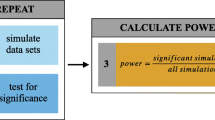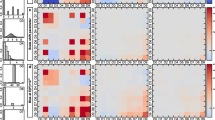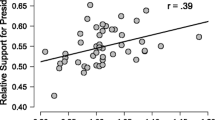Abstract
The notion of common cause closedness of a classical, Kolmogorovian probability space with respect to a causal independence relation between the random events is defined, and propositions are presented that characterize common cause closedness for specific probability spaces. It is proved in particular that no probability space with a finite number of random events can contain common causes of all the correlations it predicts; however, it is demonstrated that probability spaces even with a finite number of random events can be common cause closed with respect to a causal independence relation that is stronger than logical independence. Furthermore it is shown that infinite, atomless probability spaces are always common cause closed in the strongest possible sense. Open problems concerning common cause closedness are formulated and the results are interpreted from the perspective of Reichenbach's Common Cause Principle (RCCP).
Similar content being viewed by others
REFERENCES
F. Arntzenius, "The common cause principle, "PSA 1992 2, 227–237 (1993).
N. Belnap and L. E. Szabó, "Branching space-time analysis of the GHZ theorem, " Found. Phys. 26, 989–1002 (1996)
J. Butterfield, "A space-time approach to the Bell inequality, "in Philosophical Consequences of Quantum Theory, J. Cushing and E. McMullin, eds. (University of Notre Dame Press, Notre Dame, 1989), pp. 114–144.
N. Cartwright, "How to tell a common cause:generalization of the conjunctive fork criterion, "in Probability and Causality, J. H. Fetzer, ed. (Reidel, Boston, 1987), pp. 181–188.
J. H. Fetzer, ed., Probability and Causality (Reidel, Boston, 1988).
R. Haag, Local Quantum Physics (Springer, New York, 1992).
P. Halmos, Measure Theory (Van Nostrand, New York, 1950).
G. Hofer-Szabó, M. Rédei, and L. E. Szabó, "Reichenbach 's common cause principle: recent results and open questions, "Rep. Phil. 20, 85–107 (2000).
G. Hofer-Szabó, M. Rédei, and L. E. Szabó, "On Reichenbach 's common cause principle and Reichenbach 's notion of common cause, "Brit. J. Phil. Sci. 50, 377–398 (1999).
T. Placek, "Stochastic outcomes in branching space-time. An analysis of Bell theorems, "Brit. J. Phil. Sci. 51, 445–475 (2000).
T. Placek, Is Nature Deterministic? (Jagellonian University Press, Cracow, 2000).
M. Rédei, "Logical independence in quantum logic, "Found. Phy. 25, 411–422 (1995).
M. Rédei, "Logically independent von Neumann lattices, "Inter. J. Theor. Phys. 34, 1711–1718 (1995).
M. Rédei, "Reichenbach 's common cause principle and quantum field theory, "Found. Phy. 27, 1309–1321 (1997).
M. Rédei, Quantum Logic in Algebraic Approach (Kluwer Academic, Dordrecht, 1998).
M. Rédei, "Reichenbach 's common cause principle and quantum correlations, "in Modality, Probability and Bell 's Theorems, NATO Science Series II, Vol. 64, T. Placek and J. Butterfield, eds. (Kluwer Academic, Dordrecht, 2002), pp. 259–270.
M. Rédei and S. J. Summers, "Local primitive causality and the common cause principle in quantum field theory, "Found. Phy. 32, 335–355 (2002).
M. Rédei and S. J. Summers, "Remarks on causality in relativistic quantum eld theory, "Intern. J. Theor. Phy. (forthcoming, preprint version:quant-ph/0302115).
H. Reichenbach, The Direction of Time (University of California Press, Los Angeles, 1956).
W. C. Salmon, "Why ask 'Why?', ?"Proceedings and Addresses of the American Philosophical Association 51, 683–705 (1978).
W. C. Salmon, "Probabilistic causality, "Pacfic Philosophical Quarterly 61, 50–74 (1980).
W. C. Salmon, Scientific Explanation and the Causal Structure of the World (Princeton University Press, Princeton, 1984).
E. Sober, "Common cause explanation, "Phil. Sci. 51, 212–241 (1984).
E. Sober, "The principle of the common cause "in [5 ], pp. 211–228.
E. Sober, "Venetian sea levels, British bread prices, and the principle of common cause, "Brit. J. Phil. Sci. 52, 331–346 (2001).
W. Spohn, "On Reichenbach 's principle of the common cause, "in Logic, Language and the Structure of Scienti c Theories, W. Salmon and G. Wolters, eds. (University of Pittsburgh Press, Pittsburgh, 1991), pp. 211–235.
S. J. Summers, "Bell 's inequalities and quantum field theory, "in Quantum Probability and Applications V., (Lecture Notes in Mathematics #1441)(Springer, New York), pp. 393–413.
S. J. Summers, "On the independence of local algebras in quantum field theory, "Rev. Math. Phys. 2, 201–247 (1990).
P. Suppes, A Probabilistic Theory of Causality (North-Holland, Amsterdam, 1970).
P. Suppes and M. Zanotti, "When are probabilistic explanations possible?, "Synthese 48, 191–199 (1980).
J. Uffink, "The principle of the common cause faces the Bernstein Paradox, "Phil. Sci.Suppl. 66, 512–525 (1999).
B. C. Van Fraassen, "The pragmatics of explanation, "Am. Phil. Quart. 14, 143–150 (1977).
B. C. Van Frassen, "Rational belief and the common cause principle, "in What? Where?When?Why?, R. McLaughlin, ed. (Reidel, Boston, 1982), pp. 193–209.
B. C. Van Fraassen, "The charybdis of realism:epistemological implications of Bell 's Inequality ", in Philosophical Consequences of Quantum Theory, J. Cushing and E. McMullin, eds. (University of Notre Dame Press, Notre Dame, 1989), pp. 97–113.
Author information
Authors and Affiliations
Rights and permissions
About this article
Cite this article
Gyenis, B., Rédei, M. When Can Statistical Theories Be Causally Closed?. Foundations of Physics 34, 1285–1303 (2004). https://doi.org/10.1023/B:FOOP.0000044094.09861.12
Issue Date:
DOI: https://doi.org/10.1023/B:FOOP.0000044094.09861.12




